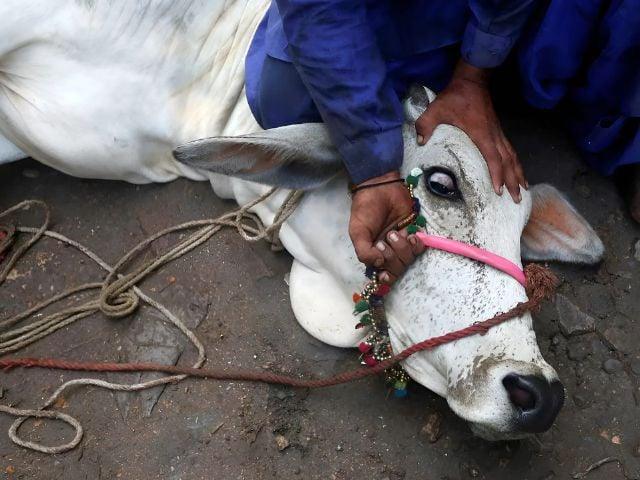Karachi:
Citizens all over the city find it difficult to get professional butchers to perform Sunnah from Hazrat Ibrahim (AS). Professional butchers have increased their rates by 30 to 50 percent this year.
Babu Qureshi, a professional butcher from Liaquatabad, explained that the rates for the slaughter of animals vary depending on the area and the animal’s weight or size. He noted that professional butchers typically stop taking bookings three days before Eidul Azha.
This year, the minimum tax varied for slaughtering a large, lighter animal on the first day of Eid from RS20,000 to RS30,000 and above. The second day the rate falls to around RS18,000, and on the third day it falls further to approx. RS15,000. Prices for heavier animals with excess weight are negotiated before slaughter.
Professional butchers have taken bookings for several animals at neighborhood level instead of single animals. Last year, professional butchers charged RS15,000 to RS25,000 or more to slaughter a large animal. This year, the rates range for goats and get from RS8,000 to RS15,000. On the second and third day, the rates of small animals fall by 30 to 50 percent.
Qureshi added that professional butchers have prioritized bookings in exclusive neighborhoods where compensation is generally higher. In contrast, many areas of intermediate and lower income turn to seasonal butchers due to the limited availability of qualified professionals. Seasonal butchers and after a daily pay basis and only takes the slaughterhouse during the Eid-Garden stepped in to fill the gap. They offer their services to 30 to 50 percent lower rates than the professional butchers.
These seasonal butchers often work in groups and are more in demand in middle -class areas where they get better wages.
Rush for grinding
People are seen buying new tools and getting the old tight to prepare meat after slaughter. As a result, stores that sharpen knives and columns are overloaded with huge footfalls of citizens.
At Al-Karam Square, Mohsin Ali, the owner of a store that sells and sharpens such tools, said that a wide range of knives, cleaves (Bugdah) and spears are in great demand. The prices of new tools for household use have risen by RS100 to RS400. Different types of knives are sold to RS400 for RS2,500 or more, while the price of a Bugdah ranges from RS800 to RS3,000.
Most people choose to sharpen their old tools, with sharpening services that cost RS150 for RS200 per day. Tool. Some people buy tools worth up to RS3,000 to prepare sacrificial flesh.
Slaughter accessories fly from the shelves
Exponential amounts of data almates and baskets were sold to Eidul Azha victim purposes, where suppliers quickly reported sales in the days that led to the festival.
Amir Udin, a supplier selling mats, baskets and wooden cutting of blocks in Gharibabad, explained that date -palm mats are typically used to spread sacrificial meat while basking is used to distribute it. This year, on Eid, Mats in different sizes were sold to RS500 for RS1,000, and baskets were sold to RS200 for RS400. Meanwhile, chopping blocks were sold to RS100 per year. Kg, where the smallest ones sold for RS500 for the RS800.
These items are made of wood and are important for meat distribution and storage. People who perform the Sunnah of Victims buy these items to facilitate the distribution of meat among family, friends and the distressed. Temporary stalls were created across different urban areas to sell these products, which provided temporary employment and additional income for many people, including street vendors and craftsmen making these traditional objects.



